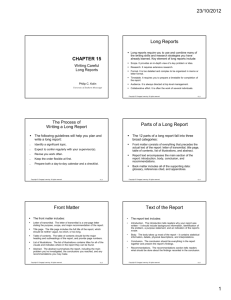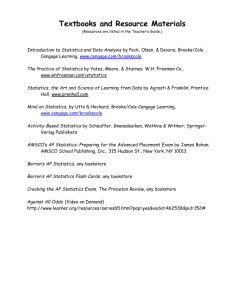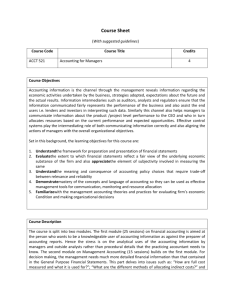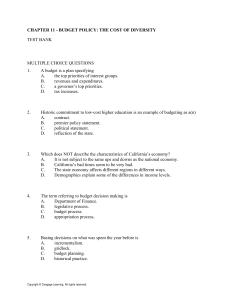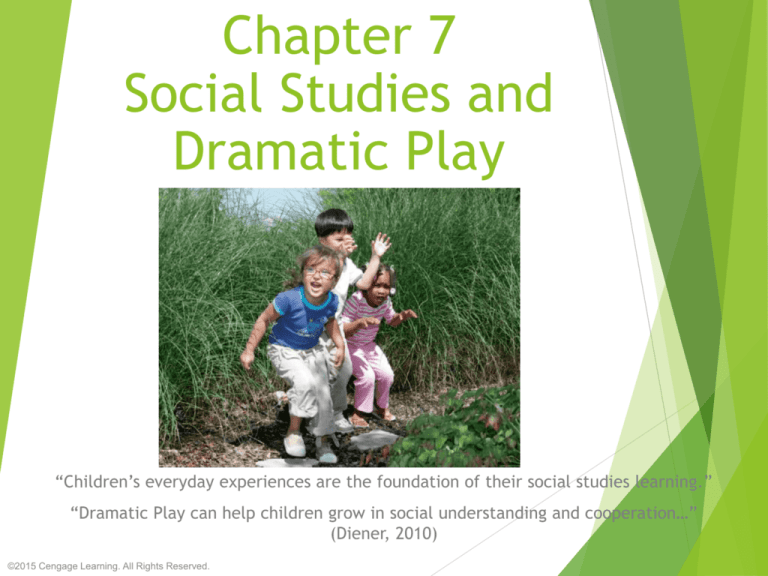
Chapter 7
Social Studies and
Dramatic Play
“Children’s everyday experiences are the foundation of their social studies learning.”
“Dramatic Play can help children grow in social understanding and cooperation…”
(Diener, 2010)
©2015 Cengage Learning. All Rights Reserved.
Social Studies
Prepares children with
knowledge, skills, and
attitudes they need to
participate in and contribute
to their world
Focuses on ensuring that
children feel good about
themselves first so that they
can eventually make positive
contributions to society
Provides firsthand experiences
with the world
©2015 Cengage Learning. All Rights Reserved.
Social Studies
Builds on what children know and are
interested in
Focuses on hands-on learning about
relevant themes rather than the teaching
of isolated facts
©2015 Cengage Learning. All Rights Reserved.
The NCSS Curriculum
Standards: 10 Themes
Culture
Time, continuity,
and change
People, places,
and environments
Individual
development and
identity
Individuals,
groups, and
institutions
©2015 Cengage Learning. All Rights Reserved.
Power, authority, and
governance
Production,
distribution, and
consumption
Science, technology,
and society
Global connections
Civic ideas and
practices
Core of Social Studies
Social sciences
Anthropology
Sociology
History
Geography
Economics
Psychology
©2015 Cengage Learning. All Rights Reserved.
Purpose of Social Studies
Understanding each child’s uniqueness while
connecting her to family, community, the
nation, and the world
Develop the ability to make informed and
reasoned decisions for the public good as
citizens of a culturally diverse, democratic
society in an independent world
Develop a positive self-concept, understand
role in the family, become aware of own and
others’ cultural heritage, function in a
multicultural classroom environment, and
understand the need for rules and laws
©2015 Cengage Learning. All Rights Reserved.
Play
Play is the natural language of children and is
at the core of developmentally appropriate
practice
Infants imitate others
Awareness of human expression, gestures, and
sounds is the beginning of creative thinking
Toddlers love pretend
Dramatic play is most valuable form of
children’s play
Helps children grow in social understanding and
cooperation as they try out adult roles and new
ways to solve problems
©2015 Cengage Learning. All Rights Reserved.
Dramatic Play Defined
Dramatic play
Free play of children
Spontaneous play that can be expanded
or repeated over and over just for fun
Sociodramatic play
The highest level of symbolic play
Happens when at least two children
cooperate in dramatic play
Involves two basic elements
Imitation and make-believe
©2015 Cengage Learning. All Rights Reserved.
Developmental Stages
of Dramatic Play
Parten’s Developmental Stages of Play (play
in terms of social behavior)
Unoccupied behavior
Onlooker play
Solitary play
Parallel play
Associative play
Cooperative play
©2015 Cengage Learning. All Rights Reserved.
Developmental Stages of
Dramatic Play (continued)
Piaget
Play in terms of
cognitive
development
Practice
play
Symbolic
Games
play
with rules
©2015 Cengage Learning. All Rights Reserved.
Smilansky
Four types of
sociodramatic play
Functional
play
Constructive
Dramatic
Games
play
play
with rules
Fantasy Play
Serves many purposes
Allows child to accomplish
through imagination what
she is unable to do in
reality
Relieves emotions
Offers a way for child to
interpret the world
Offers a vehicle for
expression if the child is
feeling shy or insecure
about verbalizing
©2015 Cengage Learning. All Rights Reserved.
Understanding of Fantasy
and Reality in Children
Dramatic play helps children separate what is
make-believe from what is real
The younger the child, the more play is rooted
in fantasy
By age 5, children start to differentiate when
they are pretending and when they are in the
real world
Encourage use of language to help them
differentiate
©2015 Cengage Learning. All Rights Reserved.
Developmental Theories
Supporting Social Studies
Multiple Intelligences
Sociocultural Theory
Howard Gardner
Lev Vygotsky
Cognitive
Developmental Theory
Jean Piaget
©2015 Cengage Learning. All Rights Reserved.
Planning and Preparing
the Environment
Provide unstructured time, adequate space,
flexible materials, and uninterrupted
opportunity for the children to enjoy dramatic
play
Environment should say, “Pretending is
welcome here!”
Environment should support pretending and
allow children’s input
Furniture and equipment considerations
©2015 Cengage Learning. All Rights Reserved.
Setting the Stage for
Dramatic Play
Provide stimulating props, unstructured
time, and adequate space for dramatic play
Create curtains, windows, a fireplace, and
real plants to make the area home-like,
comfortable, and welcoming
Select props that are authentic and can be
used naturally and safely
©2015 Cengage Learning. All Rights Reserved.
Setting the Stage for
Dramatic Play
Change props frequently and include ones
that reflect different cultures
Avoid props and activities that are sexist or
racist
Select dress-up clothes and outfits that are
simple, durable, and easy to get on and off
©2015 Cengage Learning. All Rights Reserved.
Changing the Stage
Some teachers keep the home living
(housekeeping) area intact as a permanent
center and set up a second dramatic play
area that expands the theme of the lesson
plan or project in which the children are
involved
Others, who are limited in classroom space,
may choose to have a dramatic play center
that changes periodically and sometimes will
include the kitchen area or another room in
the home
©2015 Cengage Learning. All Rights Reserved.
Changing the Stage
Others take the dramatic play center
outdoors to take advantage of the additional
space available
Outdoor dramatic play often incorporates
wheel toys, wagons, and tricycles to create
scenarios like an ambulance rushing to help
sick people, a gas station, a drive-through car
wash on splash day, and much more
©2015 Cengage Learning. All Rights Reserved.
Basic Equipment
The basic equipment for the home
living/dramatic play center should be
Child-sized furniture made of wood or sturdy
plastic including tables, chairs, rocking chair,
and shelves
“Play” sink, stove, and refrigerator
Full-length mirror
Dolls of both sexes representing different
cultural features and skin coloring
Doll bed or cradle
Two sturdy, nonworking telephones
©2015 Cengage Learning. All Rights Reserved.
Clothes for Dramatic Play
Variety of roles,
traditional, unisex
Easy access
Use to teach dressing
skills
Durable
Safety
Storage and display
location
Variety of cultures
should be represented
©2015 Cengage Learning. All Rights Reserved.
Prop Boxes
Contain materials to enrich play around a
theme
Consider many sources for materials such
as recycled or donated materials
Materials support group play
Safe, attractive, durable, and appropriate
There is a wide variety of materials that
are relevant to the theme
Literacy is an integral part of this prop box
©2015 Cengage Learning. All Rights Reserved.
Prop Boxes
Materials support language, sociodramatic
play, social skills, fine motor, and gross
motor development
The box is well put-together and
organized
Materials are properly stored and labeled
©2015 Cengage Learning. All Rights Reserved.
Reflect on This
If there are only Anglo children in a
classroom, why is it important to have
representation from many cultures in all
areas of the early childhood classroom?
©2015 Cengage Learning. All Rights Reserved.
Easy-to-Make Puppets
Hand puppets
Shadow puppets
Finger puppets
Translucent screen
Hand, glove, and
mitt puppets
Light source from
behind
Paper plate or bag
Stick or rod puppets
puppets
Single stick—dowel
Marionettes
rod, tongue depressor,
Controlled by
craft stick, and the
strings
like
©2015 Cengage Learning. All Rights Reserved.
Wooden spoon
Puppet Making Materials
Should be available on a regular basis for
whenever a child wants or needs to create a
puppet
Materials include
Boxes
Buttons and wiggly eyes
Clothespins
Cloth scraps
Marking utensils
Egg cartons
Feathers
Gloves
Leather scraps
Magazines, catalogues
©2015 Cengage Learning. All Rights Reserved.
Office supplies
Paper products
Socks
Sticks
Styrofoam balls
Tape
Wooden spoons
Wood scraps
Yarn
Suggestions for Placement
and Storage of Puppets
Have a puppet center
Place puppets throughout the classroom
Children should be able to move puppets to
other locations in the classroom
Have clear guidelines for use of puppets
Stage isn’t necessary for creative, spontaneous
use
Story apron
Ideas for creating stage
©2015 Cengage Learning. All Rights Reserved.
Integrating Dramatic Play
into the Curriculum
Infants
Doll corner
Home living area
Push-and-pull toys
Crawling and climbing area
Toddlers
Home living area
Dress-up clothes
Prop box
Puppet and mask play corner
Beauty/barber shop
©2015 Cengage Learning. All Rights Reserved.
Integrating Dramatic Play
into the Curriculum (continued)
Preschoolers
Travel
agency
Ship
Train
station and train
Airport
and airplane
Supermarket/grocery
Farmer’s
market/Mercado
Picnic
Ants
store
at a picnic
©2015 Cengage Learning. All Rights Reserved.
Integrating Dramatic Play
into the Curriculum (continued)
Primary-grade children
Doll houses
Skits
Rag doll/tin man/marionette
Imaginary machine
Mirror images
©2015 Cengage Learning. All Rights Reserved.
Dramatic Play and
Other Issues
Integration with other curriculum areas
Language and literacy
Math and science concepts
Developmentally appropriate activities
©2015 Cengage Learning. All Rights Reserved.
Preparing for Puppet Play
Introduce the puppets
Types depend on ages and development of
children
Use different types
Alternate activities to address needs of learning
styles and developmental domains
Teacher should model the use of puppets
during group time across curricular areas
(especially focusing on nonviolent behavior)
Teacher and children should create and use
puppets together
©2015 Cengage Learning. All Rights Reserved.
Puppets Across
the Curriculum
Puppets can
Speak in all languages
Along with props, expand the language arts
center
In digital age, reinforce the need for high touch
Enhance storytelling
Help reinforce cooperation, rules, and problem
solving
Emphasize the importance of listening
Be included in outdoor play
©2015 Cengage Learning. All Rights Reserved.
Goals of Social Studies
Develop a child’s positive self-concept
Further an understanding of a child’s role in
the family
Develop an awareness of a child’s own cultural
heritage
Provide an inclusive, multicultural classroom
environment
Develop an understanding of the need for rules
and laws
Teachers provide daily role models
©2015 Cengage Learning. All Rights Reserved.
Activities that Support
Goals of Social Studies
Stories and drawings
Activities specific to families and homes
Maps or place awareness
Three-dimensional
Story mapping
Time lines for primary-aged children
Personal
Interactive timelines
©2015 Cengage Learning. All Rights Reserved.
Field Trips
Walking
trips
Neighborhood
walks
Mini-field
trips
Major
field trips
Specific-purpose
field trips
©2015 Cengage Learning. All Rights Reserved.
Planning for Successful
Field Trips
Decide what an appropriate field trip should
provide
Select the site
Visit the location
Plan for the trip
Take the trip
Prepare follow-up activities
Evaluate the trip
©2015 Cengage Learning. All Rights Reserved.
Planning for Successful
Field Trips (continued)
Careful planning
also includes
Safety first
Charged cell phone
Preparing yourself
Preparing the
children
Emergency contact
numbers
First-aid kit
Count heads
Preparing the
families
Enjoy!!!
©2015 Cengage Learning. All Rights Reserved.
Follow-up and
assessment
Reflect on This
How can a school or center program
connect children to the community if they
cannot take field trips?
©2015 Cengage Learning. All Rights Reserved.
Technology in Social Studies
and Dramatic Play
Children can use the Internet or the teacher
can develop a WebQuest to research social
studies or dramatic play topics
Barcode scanners, mobile telephones,
portable computers, cash dispensers, and
parking lot ticket machines can be
integrated into dramatic play scenarios
Photos or videos taken by students’ families
on vacation can be integrated into lessons
about different cultures and countries
©2015 Cengage Learning. All Rights Reserved.
Multicultural Materials
People from different cultures are different
in a variety of ways, including ways of
looking at things, dressing, and expressing
personality
Permeate daily classroom life through
frequent hands-on activities that explore
similarities and differences
Beginning with but not limited to who is
represented in class
Children can be introduced to differences
and similarities by including multicultural
materials throughout the classroom
©2015 Cengage Learning. All Rights Reserved.
Multicultural/Anti-Bias
Activities
Evaluate your classroom to ensure this
approach is supported
Activities that can utilize this approach
Family quilts
Making the class into a neighborhood
©2015 Cengage Learning. All Rights Reserved.
Dramatic Play for
Each and Every Child
Apply only those rules needed for safety
Let the child take the lead
Monitor interactions and gradually decrease
direct intervention
Encourage verbalization
Offer familiar materials
Use puppets and props that provide an
obvious cue
Dress-up clothes—easy on and off
Supply supportive seating to offset fatigue
©2015 Cengage Learning. All Rights Reserved.
Creating Partnerships with
Families
Acknowledge and respect children’s home
language and culture
Obtain family input from all involved persons
Focus on building and maintaining reciprocal
relationships
Build a sense of trust
Post weekly menus and lesson plans
Invite them to visit the classroom
Guide them into making prop boxes at home
with their children
©2015 Cengage Learning. All Rights Reserved.
Creating Partnerships with
Families (continued)
Develop communication systems
Include use of emails or technology
Governing or advisory groups must include
family as members
Family get-togethers
Open houses
Family-teacher conferences
Invite family members to share interests
Complementary learning supports
©2015 Cengage Learning. All Rights Reserved.
Taking Puppets Home
Send families information via letters or emails about puppet presentations in the
community
Send families notes and letters in their
native languages
Conduct informal family meetings
Start a puppet lending library
©2015 Cengage Learning. All Rights Reserved.
Guidance for
Superhero Play
Show children that superheroes are not
special just because they are physically
powerful
Point out when superheroes show kindness
and helpfulness to others, and show
appreciation to the children when they do
the same
Talk about real heroes and heroines with
children
Help children build on their interests
through superhero play, such as space
travel or insects
©2015 Cengage Learning. All Rights Reserved.
The Teacher’s Role
Provide time, space, materials
Monitor area so all children can participate
Assist children in learning social interaction
and problem solving
Keep developmental capabilities in mind
Value play
Safety
Anti-bias in approach and materials
Serve as facilitator
©2015 Cengage Learning. All Rights Reserved.
Tips for Teachers
Include diverse individuals in wall and room
decorations
When children see themselves reflected in
classroom materials, they understand that
who they are is valued, accepted, and
deemed important
Use language with children that
demonstrates an acceptance of all cultures
Word choices indicate acceptance and often
determine behavior in children
©2015 Cengage Learning. All Rights Reserved.
Tips for Teachers
Field trips and guest speakers are reflective
of many cultures
Students have an opportunity to see
themselves or individuals in their
communities as something of value
©2015 Cengage Learning. All Rights Reserved.


